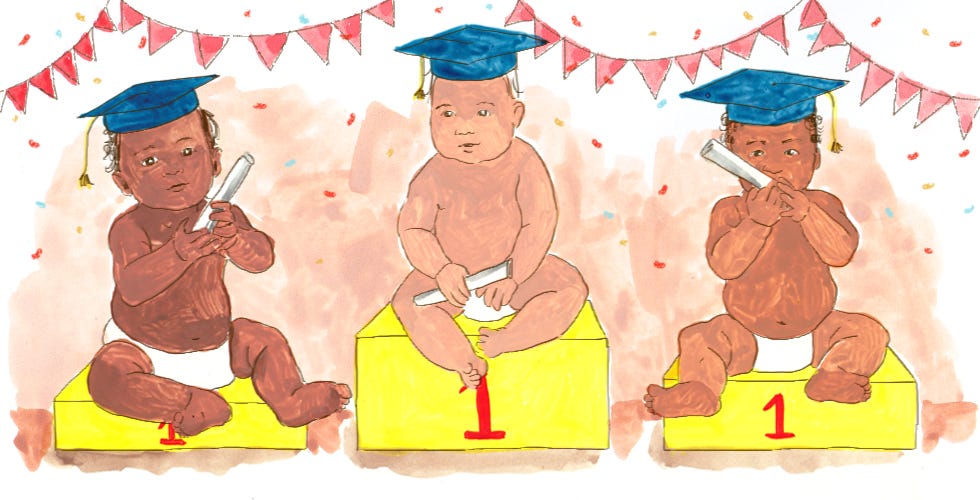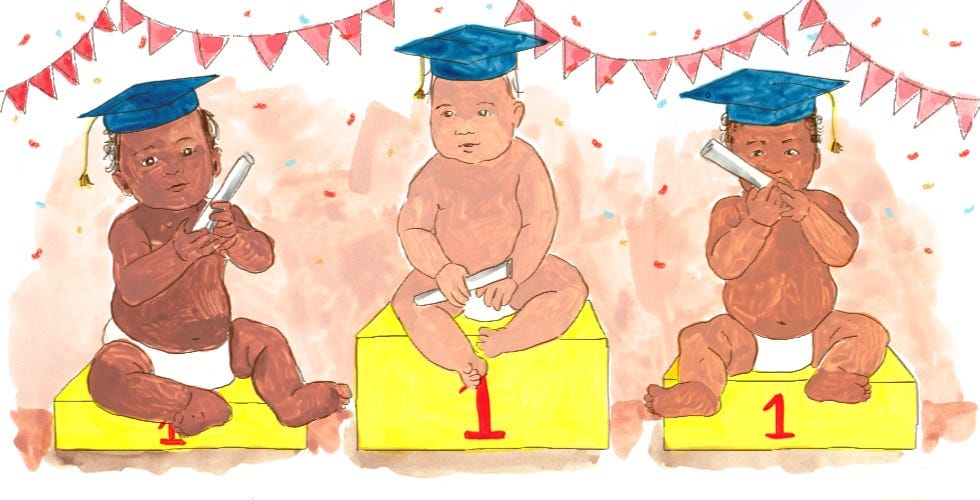
By Rhea St. Julien
Of all the bizarre things strangers said to me upon seeing my pregnant belly, one really stayed with me. “Pregnant in San Francisco! You’d better get their name on preschool wait lists now!” I laughed, and the lady who made the suggestion chuckled along with me, then leaned in closer, “No. Seriously, though. You have that baby’s name on some lists, right?”
I walked away feeling unsettled. I hadn’t even checked to see if the crib we bought would fit in our bedroom, never mind researched schools I wouldn’t need for another three years. I checked with some friends — was this a real thing?
“I’ve had my baby’s name on pre-K lists since she was in utero,” my friend Yesenia told me. “No luck yet.” Her three-year-old zoomed around us, and I wondered, was getting my kid into a preschool going to be harder than I imagined?
San Francisco is such a competitive environment, one in which we duke it out for everything from apartments and parking spaces to spots in line for loaves of Tartine bread. It’s so expensive to live here that no one in their right mind would do it unless we truly believed it was the best choice for us and our family, or simply because it’s the best city in the world.
It turns out that spirit of wanting “the best” has infected San Francisco parents to the point where we are creating a culture of fear around getting our children into the “right” preschool, rather than determining what situation works best for our particular family. It’s true that the schools perceived as high quality here have long wait lists and few openings. However, when is the last time anyone asked where you went to preschool?
I have heard parents on school tours ask “Where do alumni of this preschool go to college?” and then watched the look in the admissions counselor’s eyes go blank as they mentally cross that future-tripping family off their list of possible acceptances.
No one wants their kid to be a “spiral of failure,” which is what Steve Barnett, director of the National Institute for Early Education Research at Rutgers University, called kids who attend underfunded pre-K programs in a recent NPR article about the concept of “high-quality” preschool. But who calls a child a “spiral of failure,” anyway? It is exactly this idea — one mistake might haunt our children for the rest of their lives — that is driving the hyper-competitive environment of preschool admission.
Technically, there are enough preschool programs for every child in San Francisco to attend before they reach kindergarten, some of which are subsidized by Preschool for All, and some that are completely free. There are 397 preschools in San Francisco, half of which are needs-based programs, while the other half are full-fee schools. That number doesn’t even count all the in-home providers, which are licensed differently and harder to track. So, even if your child didn’t get into the 15 schools you applied to, it really is going to work out — you are most likely overthinking things.
I have heard parents on school tours ask “Where do alumni of this preschool go to college?” and then watched the look in the admissions counselor’s eyes go blank as they mentally cross that future-tripping family off their list of possible acceptances. If the old adage holds that 20% of your clients take 80% of your time, then parents, do your best to relax and prove to the teachers that you are not going to be that needy 20%.
Instead of asking if alumni go on to become Oxford fellows, ask “How far is this school from my house?” “Has anyone died here?” “Does it look like a suitable place for my child to eat dried glue off their hands and learn to sit in a circle without weeing themselves?” Make your decision based on that criteria, not on whether Steve Jobs went there, or which schools are getting buzz on the playground.
When I spoke to Tejal Shah from KidAdmit, an SF-based online service that helps parents and schools streamline the preschool admission process, she wanted to debunk the myth that there are feeder schools that flow into good elementary and, subsequently, high schools. In fact, these schools want to attract kids from all over the city, so they won’t take many from any one preschool, no matter how popular it is.
Instead of asking if alumni go on to become Oxford fellows, ask “How far is this school from my house?” “Has anyone died here?” “Does it look like a suitable place for my child to eat dried glue off their hands and learn to sit in a circle without weeing themselves?”
It would be a good thing for the San Francisco preschool admission process if it could be completely disproven that some schools are “unparalleled.” It creates a miasma of expectations and a brand recognition bottleneck in which there are thousands of applications for a few spots, with families commuting from the peninsula and beyond to attend these highly reputable places. Shah pointed out that even if you apply to 10 of these popular schools, the chance of getting into one is very slim. You have to widen your perspective and go with the place that is best for your family, rather than the one that looks like a mini-Harvard.
When you are sitting down to look at prospective preschools, take a Xanax, a deep breath, and ask yourself, what is enough for my child? There is often a gnawing anxiety in these kinds of parenting decisions: If your child is not tracked the right way, something bad will happen to them and you will be the one to blame. I sincerely doubt your kid will one day say to you, “If only you got me into Lone Mountain Preschool, then I would never have turned out to be such a loser!”
Being a parent of a young child is incredibly stressful. When you’re not trying to prevent a public meltdown — maybe Muni is 20 minutes late and you’re not going to make it to Breakfast with Enzo — you’re dealing with real challenges, like how to keep your career going while feeding your family organic foodstuffs. In the midst of all this, it is important to keep your sense of perspective. Don’t get attached to any particular outcome, with fists clenched around the idea that if your kid doesn’t get into a top preschool by age 2.75, their future is tanked.
Eventually, everyone finds the right situation, even if it means taking a chance on a school that has just opened, perhaps in a home-based program. That is exactly what worked for our family. After touring a few schools, we applied to just one: a brand new, tiny school that was started in someone’s apartment four blocks from where we live. Two years later, that school has a wait list windier than Lombard Street, so I know we got in at just the right time, but new schools like this open every year.
If you’re looking for a magic formula to get in, it doesn’t exist, and most advice about how to get to the top of the list is usually not helpful. Many parents told me they thought it was their lack of diversity that kept them out of the top schools, but the reality is that most private preschools in San Francisco are sorting more for age and gender balance than for the fact that your family will bolster the racial profile. Even off the record, none of the educators or admissions counselors I spoke to could lend any truth to the idea that straight, white families have a disadvantage when it comes to admission. However, several of them did admit that what you do for a living is sometimes a consideration, in regards to how your skills could contribute to keeping the school afloat. The truth is that this process is largely out of your control, and no matter how frustrating it is, trust me, the kids are gonna be alright.







